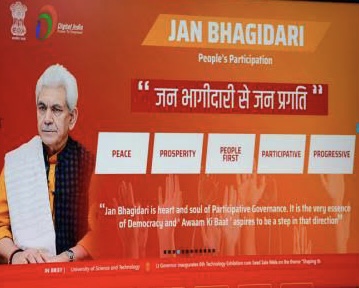JAMMU, FEBRUARY 20: Continuing with its overarching digital push in J&K, government has hosted the ‘Janbhagidari Empowerment’ portal on a different server with higher bandwidth for its easy and ready accessibility to the general public.
This intervention comes following the concerns relating to the slow speed/bandwidth issues regarding the portal, which has caused disenchantment amongst users despite its great value as an information platform.
The Chief Secretary, Dr AK Mehta recently reviewed the issue of slow speed and band outages regarding the portal with IT department and directed the department to upgrade the server to improve the speed of the browser for desired impact.
Following the movement of the portal on to a different server, the portal has begun to open quickly enough, improving the whole experience of visiting the portal.
Around 70000 people have accessed the portal until now. With increase in the bandwidth, the portal is expected to receive more hits in near future.
The portal can be accessed by logging on to the website https://janbhagidari.jk.gov.in/.
The portal is a one stop interactive and user-friendly digital platform giving detailed insights to the people into the nature, status and the number of developmental works being executed in their areas.
The works could be searched with respect to their location in each district, block/municipality and village.
In what is its unique selling point, the users can also send in their feedback about any work implemented by government in their areas.
The portal also has links to schemes like MGNREGA, Pradhan Mantri Awas Yojana, Swachh Bharat Mission Urban, Swachh Bharat Mission Rural and PMGSY under execution in the government and the users can click on these links to gain instant access to the works being carried out under these schemes.
The objective of the portal is to encourage the citizens to access the website to gain firsthand knowledge of the works being executed in their areas and give their feedback about the quality and pace of work in their respective areas so as to ensure equitable and inclusive development.

